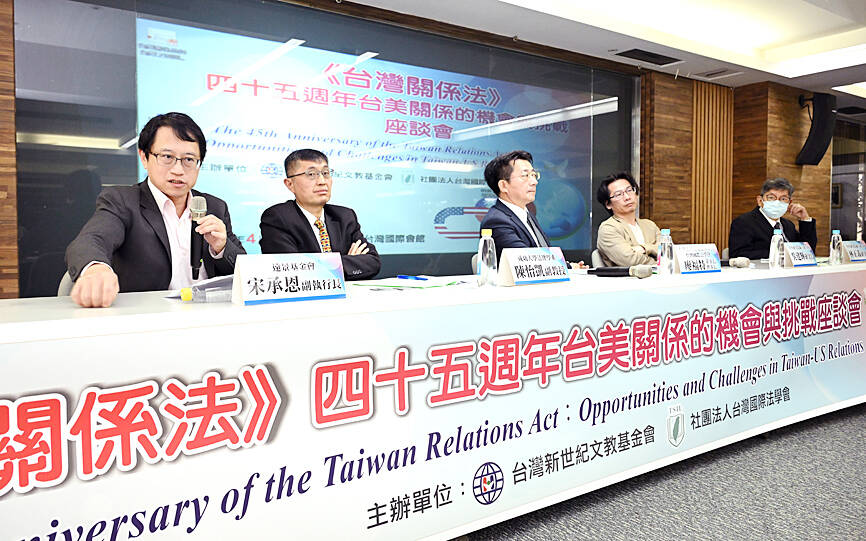The US’ repeated calls for a peaceful resolution to cross-strait differences means that it would increase arms sales to Taiwan if there is no peace across the Taiwan Strait, as arms sales and peace are linked, an academic said in Taipei yesterday.
Prospect Foundation deputy executive director Song Cheng-en (宋承恩) made the remarks at a symposium titled “The 45th Anniversary of the Taiwan Relations Act — Opportunities and Challenges in Taiwan-US Relations” held by the Taiwan New Century Foundation and the Taiwanese Society of International Law.
Song said the US’ Taiwan Relations Act (TRA) is expanding its previous framework of maintaining peace and stability in the western Pacific to the Indo-Pacific, ensuring that Taiwan has sufficient self-defense capacity and that the country’s future is determined peacefully — even making it a precondition for a US-China relationship.

Photo: Liao Chen-huei, Taipei Times
The US has reiterated this condition more frequently in the past few years, which means that if China takes a more hostile attitude toward Taiwan, the Three Joint Communiques between the US and China might become invalid, he added.
The US’ priority is the TRA, followed by the Three Joint Communiques and the “six assurances,” so the communiques cannot override the TRA, Song said.
It also explains the dense war clouds hanging over the Taiwan Strait and why many countries are concerned over China’s use of force against Taiwan, he said.
Taiwan is a part of the US’ response to China’s aggressive efforts to change the international order, he added
The “six assurances” have been implicitly mentioned before, without written text, but US President Joe Biden’s administration has mentioned it more than once in statements, and this is “something that Beijing hates the most,” Academia Sinica research fellow Lin Cheng-yi (林正義) said.
The principles behind selling weapons to Taiwan have also changed, Lin said.
In 2022, the US Senate reviewed a draft of the Taiwan Policy Act, which proposed to allow sales of arms that are not only defensive in nature, but to also allow sales of “arms conducive to deterring acts of aggression by the People’s Liberation Army [PLA].”
Although the act has not been signed into effect, much of its content was later included in other laws or stated as policy directions, Lin said.
If the TRA needs to be amended, allowing sales of weapons that can deter PLA aggression would be one option, Lin added.
Another trend is defense cooperation and planning, Song said.
The US would do its best to arm Taiwan by allowing Taiwanese troops to be trained in the US or by sending US specialists to train Taiwanese soldiers, Song added.
The Taiwan Enhanced Resilience Act, which is built on the TRA, states that the US should enhance Taiwan’s national defense by arming the nation to become a “porcupine” and helping it to thoroughly reform its defense system.
The US would also establish multilateral partnerships in the Indo-Pacific and a US-Japan-Philippines defense cooperation could be an opportunity for Taiwan to establish links with other countries, Song said.

Chinese Nationalist Party (KMT) Chairman Eric Chu (朱立倫), spokeswoman Yang Chih-yu (楊智伃) and Legislator Hsieh Lung-chieh (謝龍介) would be summoned by police for questioning for leading an illegal assembly on Thursday evening last week, Minister of the Interior Liu Shyh-fang (劉世芳) said today. The three KMT officials led an assembly outside the Taipei City Prosecutors’ Office, a restricted area where public assembly is not allowed, protesting the questioning of several KMT staff and searches of KMT headquarters and offices in a recall petition forgery case. Chu, Yang and Hsieh are all suspected of contravening the Assembly and Parade Act (集會遊行法) by holding

PRAISE: Japanese visitor Takashi Kubota said the Taiwanese temple architecture images showcased in the AI Art Gallery were the most impressive displays he saw Taiwan does not have an official pavilion at the World Expo in Osaka, Japan, because of its diplomatic predicament, but the government-backed Tech World pavilion is drawing interest with its unique recreations of works by Taiwanese artists. The pavilion features an artificial intelligence (AI)-based art gallery showcasing works of famous Taiwanese artists from the Japanese colonial period using innovative technologies. Among its main simulated displays are Eastern gouache paintings by Chen Chin (陳進), Lin Yu-shan (林玉山) and Kuo Hsueh-hu (郭雪湖), who were the three young Taiwanese painters selected for the East Asian Painting exhibition in 1927. Gouache is a water-based

Taiwan would welcome the return of Honduras as a diplomatic ally if its next president decides to make such a move, Minister of Foreign Affairs Lin Chia-lung (林佳龍) said yesterday. “Of course, we would welcome Honduras if they want to restore diplomatic ties with Taiwan after their elections,” Lin said at a meeting of the legislature’s Foreign Affairs and National Defense Committee, when asked to comment on statements made by two of the three Honduran presidential candidates during the presidential campaign in the Central American country. Taiwan is paying close attention to the region as a whole in the wake of a

OFF-TARGET: More than 30,000 participants were expected to take part in the Games next month, but only 6,550 foreign and 19,400 Taiwanese athletes have registered Taipei city councilors yesterday blasted the organizers of next month’s World Masters Games over sudden timetable and venue changes, which they said have caused thousands of participants to back out of the international sporting event, among other organizational issues. They also cited visa delays and political interference by China as reasons many foreign athletes are requesting refunds for the event, to be held from May 17 to 30. Jointly organized by the Taipei and New Taipei City governments, the games have been rocked by numerous controversies since preparations began in 2020. Taipei City Councilor Lin Yen-feng (林延鳳) said yesterday that new measures by